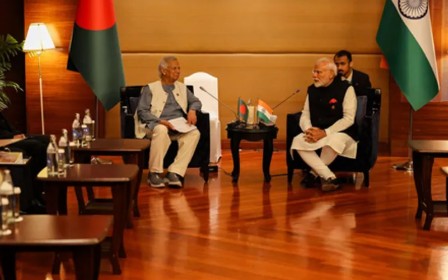
Bangkok: Prime Minister Narendra Modi held a bilateral meeting with Muhammad Yunus, Chief Advisor of the Bangladeshi interim government, on the sidelines of the 6th BIMSTEC Summit in Bangkok on Friday.
This meeting marks the first official engagement between the two leaders since Yunus’ interim government assumed power in Dhaka last August, following the ousting of former Prime Minister Sheikh Hasina.
The timing of the meeting is significant, as it occurs against the backdrop of challenging relations between India and Bangladesh, which have faced difficulties since the leadership change in Dhaka.
Yunus’ office shared on X: “Chief Adviser Professor Muhammad Yunus and Indian Prime Minister Narendra Modi engaged in a bilateral meeting on the sidelines of the sixth BIMSTEC Summit in Bangkok, Thailand.”
The meeting follows Yunus’ recent visit to China, where he made comments during a meeting with President Xi Jinping, describing Bangladesh as “the only guardian of the ocean” in the region. He proposed that India’s landlocked northeastern states, known as the “seven sisters,” could strengthen their economic connections through Bangladesh as part of China’s economic sphere.
Earlier, during an official dinner hosted by Thai Prime Minister Paetongtarn Shinawatra for the visiting dignitaries of the BIMSTEC Summit, Modi and Yunus had an informal exchange. The Bangladeshi Chief Advisor’s official X account shared images of both leaders seated next to each other at the dinner.
According to Bangladeshi media, Deputy Press Secretary Abul Kalam Azad stated that the two leaders met informally during the dinner, setting the stage for their formal discussions the following day.
The interim government in Bangladesh has expressed a desire for direct diplomatic engagement with India, making Friday’s meeting at the BIMSTEC Summit a key opportunity for both nations to reassess their ties. Moreover, Bangladesh is set to assume the BIMSTEC chairmanship, further enhancing the significance of this bilateral interaction.
Relations between New Delhi and Dhaka have deteriorated since Sheikh Hasina’s departure, with the interim government witnessing an increase in attacks against the Hindu minority in Bangladesh, raising concerns in India. The Bangladeshi administration has acknowledged these incidents, asserting that they are politically motivated rather than religiously driven.
In light of the tense political landscape, PM Modi recently reached out to Yunus with a letter commemorating Bangladesh’s National Day. In his letter, Modi highlighted the shared legacy of the Bangladesh Liberation War and emphasized the importance of mutual sensitivity in nurturing the India-Bangladesh partnership.
“I extend my greetings to you and the people of Bangladesh on the occasion of your National Day,” Modi wrote. “This day serves as a testament to our shared history and sacrifices that have laid the foundation of our bilateral partnership. The spirit of the Liberation War continues to guide our relationship, which has flourished in various ways, benefiting our peoples.”
The Prime Minister reaffirmed India’s commitment to advancing this partnership based on shared aspirations for peace, stability, and prosperity, emphasizing the importance of mutual understanding of each other’s interests and concerns.
As Bangladesh officially takes over the BIMSTEC chairmanship during the Summit, the future of India-Bangladesh relations may significantly depend on how both countries navigate their current challenges and diplomatic efforts in the upcoming months.
